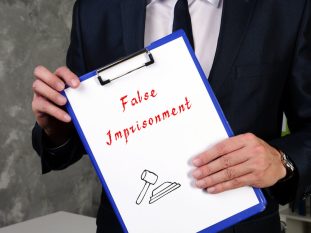Monmouth County False Imprisonment Lawyers
Facing Charges for False Imprisonment in Freehold, New Jersey

Our defense lawyers at Chamlin, Uliano & Walsh are prepared to assist clients who are being accused of false imprisonment to avoid the most severe repercussions of a false imprisonment conviction in New Jersey. Call our West Long Branch office at (732) 440-3950 if you would like an initial consultation with one of our criminal defense lawyers serving Middletown, Asbury Park, Freehold, Manasquan, Red Bank, Long Branch, Hazlet, and towns throughout Monmouth County and Southern New Jersey.
What Actions Constitute False Imprisonment in NJ?
In New Jersey, false imprisonment denotes the intentional restriction of someone’s movement without consent and without any lawful justification. For this offense to have taken, place requires evidence of deliberate intent on the part of the perpetrator.
The methods used to confine or restrain someone can involve either physical means, such as locking them up or using verbal threats which prevent their escape. To ensure that consent is legitimate, it must have been freely given without coercion or threats. Finally, it is imperative to note that detention or confinement must not have had any legitimate reason behind it. This means that if a police officer arrests someone with probable cause within legal boundaries, this will not qualify as false imprisonment. Similarly, if a store employee detains somebody whom they suspect has stolen from them based on reasonable grounds and per company policy, this would not entail false imprisonment charges either.
How Can the State Establish False Imprisonment Offenses?
There are four components to a charge of false imprisonment, and all of them must be proven beyond a reasonable doubt to obtain a conviction. The defendant must intentionally restrain the victim. The restraint must be unlawful. The restraint must be against the will of the victim, and the victim must be aware of the restraint at the time it occurred.
Charges Usually Associated With False Imprisonment in New Jersey
False imprisonment can sometimes be accompanied by other charges depending on the circumstances of the incident. If false imprisonment involves the abduction or movement of the victim to a different location, it may also constitute the more serious offense of kidnapping. If the victim was physically restrained or threatened with harm during false imprisonment, the defendant might also face charges for assault. If the false imprisonment involves sexual contact or coercion, it may also lead to charges of sexual assault. If the defendant used false imprisonment to extort money, property, or some other benefit from the victim, they might also face charges of extortion or blackmail. Another kind of false imprisonment is criminal restraint. Whereas the prosecution has only to prove that the defendant unlawfully restrained the victim, preventing them from leaving, criminal restraint requires proof of serious bodily injury. Criminal restraint is a felony offense.
Unique Characteristics of False Imprisonment in Cases of a Minor and Their Parents
False imprisonment is an act that occurs when one person deliberately confines or restrains someone else without that person’s consent or legal justification. This issue becomes particularly complex in cases involving minor children and their parents. The concept of parental rights plays a crucial role in these cases because parents typically make decisions for minors, such as where they live, how they are educated, and what medical treatment they receive. Nevertheless, these rights are not absolute, and courts may intervene should these conservative measures cause harm instead of protecting children’s welfare adequately.
In cases where allegations arise claiming parental false imprisonment of their child, the courts consider whether there was context-specific justification for restricting freedom. For instance, if limiting mobility serves safety purposes, it might not technically fit under wrongful confinement. But locking up your child should never count under acceptable parenting. To make the differences clear, sending a 10-year-old to their room and telling them to stay there until XX time has passed is not the same as bolting the door closed and not allowing them to leave of their free will. Additionally, the age and level of maturity affect how false confinement claims involving minors are approached. Younger children may be more easily manipulated into situations where they feel trapped or unable to leave.
Possible Defense Options of False Imprisonment

Contact Asbury Park False Imprisonment Defense Attorneys to Discuss Your Accusations
If you or someone you know has been accused of false imprisonment, it is of the utmost urgency that you obtain legal counsel as soon as possible. Our legal team at Chamlin, Uliano & Walsh will explain your rights and the charges against you in Rumson, Wall, Howell, Holmdel, Neptune, Colts Neck, Belmar, and other Monmouth County communities. We will investigate your case’s circumstances and elaborate a strategic plan to defend you that is tailored to your situation.
Our attorneys are practiced and experienced in criminal law, having defended clients in criminal courts throughout New Jersey for the last five decades. We pride ourselves on having the legal skill and commitment you need to contest your charges successfully.
If you or someone you know has been charged with false imprisonment or needs legal help of any other nature, please call us at (732) 440-3950 or go to the contact section of our website to schedule a confidential consultation.
